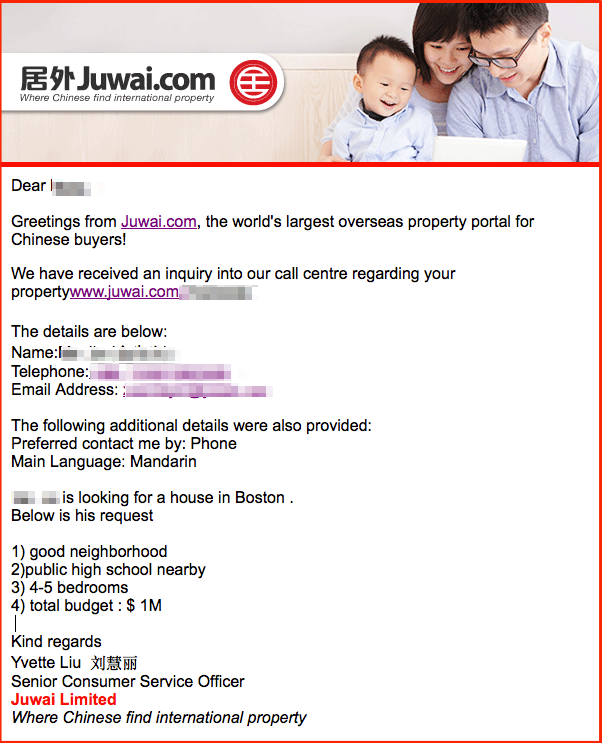亚洲新闻
- 主页
- 新闻
- 亚洲新闻
You've successfully copied this link.
Three things to know about nurturing leads from Chinese real estate buyers

For real estate agents, Juwai.com is like a freezer with two shelves, each loaded up with a different kind of mouthwatering ice cream.
On the top shelf, you have the “winning new listings” flavour – its delicious taste comes from all the new listings you have won by highlighting to sellers that you will market their property to Chinese buyers. For more on this topic, read our post, "How to use differentiation to win twice as many listings".
On the bottom shelf of this hypothetical freezer, you have a different flavour of ice cream – it’s called “selling more to Chinese buyers.” The rich and creamy taste of this variety comes from the new deals you are closing – and the new commissions you are earning – on Chinese buyer transactions.
This second flavour is the focus on this post. We will cover the same topic in more detail later. For now, let’s drop the ice cream metaphor and get right into our three insights that will improve your lead nurturing with Chinese real estate buyers.
1. The first property enquiry serves as an introduction
 The first tip focuses on the moment at which you first get to know a Chinese buyer. This is when Juwai.com sends through an email enquiry to you.
The first tip focuses on the moment at which you first get to know a Chinese buyer. This is when Juwai.com sends through an email enquiry to you.
The enquiry you receive will probably look very much like the image you see on this page. In fact, this image is a screen shot of an actual enquiry, which Juwai.com sent to an agent in the Boston area.
(You will notice that we have blurred out the private information, but otherwise it appears exactly as in real life.)
When you receive an enquiry like this, it’s like being given a delicate, warm and tiny egg.
This little egg has the potential to incubate and hatch and grow into a glorious bird. Or, if you fail to take care of it, it may simply end up smashed on the floor.
Chinese buyers are like other buyers. They often consider several properties, and research them in-depth, before deciding to make an offer on one.
They are typical buyers in another way, too. Even when they make an offer, they don’t always succeed. Sometimes, they move too slowly and lose out. Or, their offer may not match the seller’s or vendor’s expectations.
The key point here has to do with how you handle that Chinese buyer afterwards.
Even if they don’t end up as the buyers of the first property they enquired about, if handled with skill, they may still buy from you. Rather than considering their enquiry a one-time opportunity, remember the metaphor of the egg. Care for it, keep it warm and it may yet hatch into a profitable transaction.
2. Chinese buyers may be very cautious
This one makes sense if you put yourself in the shoes of a buyer from China. They are buying in another country, with a different legal system, a different language and a different property market from the ones they are used to. Everything is far away and new.
Just last week, an agent told us about a buyer to whom they sold a property in Boston. "He was very cautious all through the process,” the agent said.
For one thing, the buyer worried that the seller would try to change the price or accept a better offer, even though local law prevents that. The buyer learned to trust the agent, but was suspicious of the lawyer that had been hired to represent him on the transaction.
He worried about the lawyer’s true interests and whether he might also be working for the seller.
As the agent told us, “It took me a while to explain him about 'fiduciary duty' – meaning that the lawyers and agents have a duty to look out for the best interest of the client – that we don't work for the seller – who has their own agent and lawyer working for them."
In the end, this buyer closed his transaction, paid his fees and commissions, and was very happy.
3. Chinese buyers face logistical challenges
When you help clients overcome the obstacles standing between them and a transaction, everyone benefits.
This is especially true of Chinese buyers, who – because of the distance – face a few more logistical challenges than the typical local buyer. For example, they need to have the necessary funds in the country of the property.
The buyers need to be present in the country to sign the documents, to have arrangements made for the rapid shipping of the documents to and from them in China, or have given power of attorney to a trusted local person, so that person can sign on their behalf.
These obstacles can be overcome. Agents and real estate developers sign thousands of deals a day with Chinese buyers. That’s why they are the fastest growing buyers of international property in the world. It’s also why one-third of Chinese US-dollar-millionaires already own assets overseas.
From your perspective, however, the earlier you can help your Chinese buyers deal with these obstacles, the better. You may want to address it by email, or by providing a short description of the buying process and what is needed from them at each step.
Choose the means of educating your buyer that works best for you.
Given these three insights into Chinese buyers, what’s the most important advice we would give to real estate agents working with buyers from China?
Our best advice is this:
- Focus on connecting with Chinese clients, using Juwai.com and other means.
- Then keep in touch with them until they are ready to buy.
- Send them things like current listings, educational or market information.
- Follow up with the occasional telephone call.
- Above all, keep that little egg warm until it hatches.
[Image source: Fridge Experience by Arte_ON on Flickr.com]
喜欢这篇文章?免费注册,获取居外亚洲市场的最新资讯!
排序
- 2025
- 2023
- 2022
- 2021
- 2020
- 2019
- 2018
- 2017
- 2016
- 2015
- 2014
- 2013
- 2012
标签
- australia
- china
- chinese buyers
- investment
- juwai
- property
- real estate
- residential
- united kingdom
- united states
Thank you for subscribing to Juwai News!
Sign up for a Juwai Account now for free to enjoy FREE download access to country-specific reports on Chinese property investments.
Do you want to sign up now? Or continue if you have already signed up or you will do it later.


